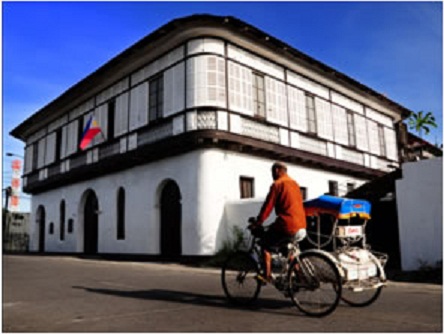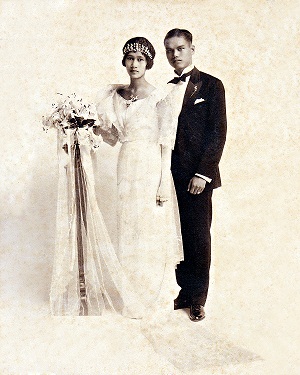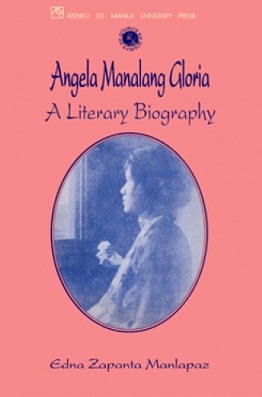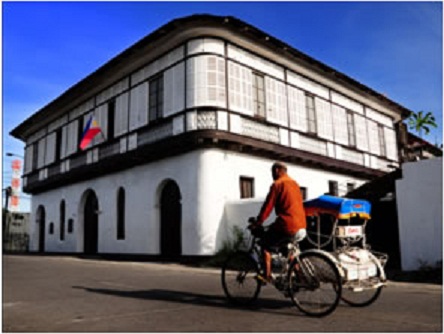By PABLO A. TARIMAN
 YOU can’t miss this landmark in Tabaco, Albay on the way to the nearby harbor.
YOU can’t miss this landmark in Tabaco, Albay on the way to the nearby harbor.
This old house stands out in the entire town overran by fast-food chains and shopping malls. Looking at it one more time before a sunset, it becomes a gentle reminder of old-world charm.
The stone house sits on a 3,700 sq. meter property formerly known as a trading center of Smith, Bell & Co.in the 1900s. It was bought by poet Angela Manalang Gloria for P50,000 in 1965.
Uncannily, the owner of the house has a colorful story and her transformation from poet to businesswoman is one for the books.
Inspired by the muse early in her life and later traumatized by war, Angela Manalang Gloria led a life perfect for cinema.
With roots traced in Guagua, Pampanga, she grew up in Albay, studied grade school at St. Agnes Academy in Legaspi and then on to St. Scholastica’s College in Manila for her secondary schooling. It was when she was under Benedictine nuns that she hoped to become a concert pianist.
 At the University of the Philippines where she took up liberal arts, she discovered her passion for poetry and painting on the sides. A fastidious and hardworking student, she graduated summa cum laude.
At the University of the Philippines where she took up liberal arts, she discovered her passion for poetry and painting on the sides. A fastidious and hardworking student, she graduated summa cum laude.
It was at UP where she became literary editor of the UP Collegian and met her future husband, Celedonio P. Gloria who was then editor in chief of the same school publication. After college, she became editor of the Herald Mid-Week Magazine
After the war, she turned to business and did well. When she turned to business full time, her poetry took the back seat.
But a clue to her literary life is provided by the book, “Angela Manalang Gloria: A Literary Biography” by Edna Zapanta Manlapaz.
Published by the Ateneo de Manila Press in 1993, the book chronicled the poet’s growing up and coming of age.
From elementary to secondary schooling, the young Angela Manalang lived in a world of dolls, books and piano. In college, her literary life flourished.
Discovered by her UP teacher, C. V. Vicker, who continued to encourage her, Manalang soon found herself touted as a rival of another poet, Jose Garcia Villa.
In one literary competition,, she submitted a poem entitled “Revolt from the Hymen” which was her own way of protesting marital rape.
The poem went thus:
O to be free at last, to sleep at last
As infants sleep within the womb of rest!
To stir and stirring find no blackness vast
With passion weighted down upon the breast,
To turn the face this way and that and feel
No kisses festering on it like sores,
To be alone at last, broken the seal
That marks the flesh no better than a whore’s!
 An all-male jury found the subject of her poem too offensive and was thus eliminated from the Philippine Commonwealth Awards in 1940.
An all-male jury found the subject of her poem too offensive and was thus eliminated from the Philippine Commonwealth Awards in 1940.
Moreover, she was also the author of a book of poetry called “Poems” in 1940. In this collection was also her last poem, “Old Maid Walking In The City.”
Again, she entered this poetry collection in the Commonwealth Literary Awards but lost to Rafael Zulueta y da Costa’s verse Like the Molave
But the truth is that the Manlapaz book goes beyond literature. It also chronicled the poet’s transformation when she lost her husband from an ambush of Japanese soldiers. How she raised her three children single-handedly and succeeded as a businesswoman was also touched in the last chapters.
The last living witness of Angela Manalang Gloria’s life and times is the stone house in her native Tabaco in Albay.
From the stairs to the wide living room, you can almost hear the music of Chopin and Liszt with her paean to the man she married:
You are my earth and all the earth implies:
The gravity that ballasts me in space,
The air I breathe, the land that stills my cries
For food and shelter against devouring days.
You are the earth whose orbit marks my way
And sets my north and south, my east and west,
You are the final, elemented clay
The driven heart must turn to for its rest.
If in your arms that hold me now so near
I lift my keening thoughts to Helicon
As trees long rooted to the earth uprear
Their quickening leaves and flowers to the sun,
You who are earth, O never doubt that I
Need you no less because I need the sky!
